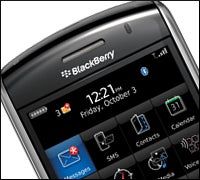 BlackBerry Storm Source: RIM. Click to enlarge. |
Research in Motion’s launch today of its BlackBerry Storm 9530, may mark the top challenger yet to face-off against Apple’s (NASDAQ: AAPL) iPhone, experts said.
“RIM is putting one foot on both sides of the smartphone fence, as this device will appeal to those who like the iPhone but also want BlackBerry capabilities,” industry analyst Jack Gold, of J.Gold Associates, told InternetNews.com.
Like BlackBerry models before it, the Storm is compatible with enterprises’ BlackBerry servers, which offer e-mail integration, security and management features. But those benefits are coupled with a slew of enhancements designed to go after consumers wanting a sleek, iPhone-like design.
“It’s a smart move … this could sway iPhone users who want an iPhone that is also an enterprise-type device,” Gold said.
RIM’s (NASDAQ: RIMM) Storm marks the handset maker’s second 3G-enabled device, but its first-ever model to sport a touchscreen, dubbed SurePress. As a result, it’s also the first BlackBerry to not offer the traditional QWERTY keyboard.
Instead, users have a on-screen, tactile keyboard that simulates the “clicking” experience of pushing BlackBerry keys — thanks to the design of the SurePress. Just like iPhone users, Storm owners also use a fingertip to sweep screens and tap between applications.
Experts have cited the touchscreen feature as having a phenomenal impact on the smartphone market since its becoming popularized on the first iPhone in 2007.
The 3G network capability is also a winning aspect, said experts, as it’s propelled strong sales for Apple since it released its 3G handset in June. RIM’s initial 3G device was theBlackBerry Bold that arrived early in November.
The Storm features an integrated music player to compete with the iPhone’s built-in iPod, and a 3.2 megapixel camera, which is slightly larger than Apple’s 2-megapixel resolution camera. The Storm also includes built-in support for editing Microsoft Word, Excel and PowerPoint files, while the iPhone supports Microsoft Exchange and rich HTML e-mail.
Both smartphones have GPS capability, but the Storm lacks Wi-Fi, which the iPhone offers. Apple’s device, however, doesn’t offer the expandable memory that the Storm provides.
The two smartphones also look very similar. Both are built with sleek, curved-corner form factors and screen displays that dominate the front of the device.
Even the marketing strategy behind the Storm has been very similar to that of Apple’s iPhone approach, one analyst noted.
Television commercials from the Storm’s U.S. carrier, Verizon Wireless, have slowly introduced the Storm in a provocative and compelling way over the past months, Ryan Reith, a senior research analyst at IDC, told InternetNews.com.
“The [Storm] launch has been unlike any other smartphone campaign except the iPhone,” Reith said. “I haven’t seen anything else like it.”
[cob:Special_Report]Verizon Wireless downplayed the efforts it was making on behalf of the Storm.
“This is business as usual. We compete every day to earn the wireless dollars of customers,” Brenda Raney, spokesperson, told InternetNews.com. “While there is increased interest in the smartphone, and many people are opting for the more sophisticated devices, the competitive nature of how we differentiate our services remains the same. It is all about the quality of the Verizon Wireless network.”
Canalys senior analyst Pete Cunningham begged to differ. He also noted the heavy marketing behind the BlackBerry Bold — which is sold by AT&T — during the past few months, which signals that the handset maker’s two carrier partners are also in a competitive battle
“From RIM’s point of view, having two high-profile devices with the two major carriers is great news and can only help its brand and shipments,” Cunningham told InternetNews.com“.
On the pricing front, both also are neck-and-neck: The Storm and iPhone 3G, which Apple launched in July, both sell for $199 with two-year data plan commitments.
All the competition has served to benefit both industry stakeholders and wireless buyers, who are eager for more advanced features. With Apple’s iPhone 3G, RIM’s newest BlackBerry devices and the arrival of the first Android smartphone — the Google HTC G1 — in October, 2008 will go down as “the year” of the smartphone, added the analyst.
“The introduction of the iPhone, the G1 and now Storm have begun to increase the presence of these devices in the consumer segment,” Cunningham said. “It’s not about people wanting mobile computing today, as much as it’s about more choices for consumers and devices that support strong multimedia, messaging and browsing experiences.”


